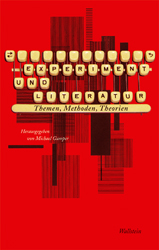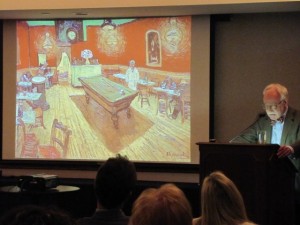 Iris Bork-Goldfield presented at the 2010 Connecticut Council Of Language Teachers (CT COLT) Fall Conference on October 25th. In their two-hour workshop for secondary and post-secondary German educators, Christine Kochefko (Ridgefield HS) and Iris Bork-Goldfield discussed the teaching of “traditional” Grimm’s fairy tales with new media. They presented creative student projects using Photostory and VoiceThread and showed how these media tools helps with the assessment of student oral performance. The presentation concluded with a discussion of multicultural themes in fairy tales by the Syrian-born German author Rafik Schami
Iris Bork-Goldfield presented at the 2010 Connecticut Council Of Language Teachers (CT COLT) Fall Conference on October 25th. In their two-hour workshop for secondary and post-secondary German educators, Christine Kochefko (Ridgefield HS) and Iris Bork-Goldfield discussed the teaching of “traditional” Grimm’s fairy tales with new media. They presented creative student projects using Photostory and VoiceThread and showed how these media tools helps with the assessment of student oral performance. The presentation concluded with a discussion of multicultural themes in fairy tales by the Syrian-born German author Rafik Schami
Faculty News
The Scene of Writing, Non-Writing
 Uli Plass and Arne Höcker organized two panels on “The Scene of Writing, Non-Writing” at last week’s Conference of the German Studies Association in Oakland. The panels examined the “scene of writing, non-writing” as the writing scene that constitutes the law of modern literature insofar as it refers to a crisis of writing in which questions of authorship and subjectivity return to the foreground. Arne Höcker’s talk focused on Adalbert von Chamisso’s 1814 novella of Peter Schlemihl (the man who sold his shadow); Uli Plass discussed the two recent books by Rainald Goetz (“Klage” and “Loslabern”).
Uli Plass and Arne Höcker organized two panels on “The Scene of Writing, Non-Writing” at last week’s Conference of the German Studies Association in Oakland. The panels examined the “scene of writing, non-writing” as the writing scene that constitutes the law of modern literature insofar as it refers to a crisis of writing in which questions of authorship and subjectivity return to the foreground. Arne Höcker’s talk focused on Adalbert von Chamisso’s 1814 novella of Peter Schlemihl (the man who sold his shadow); Uli Plass discussed the two recent books by Rainald Goetz (“Klage” and “Loslabern”).
Authority, Responsibility, and Creative Writing: Arne Höcker on Scientific Authorship
 Arne Höcker’s article on Scientific Authorship appeared in the compendium Experiment und Literatur. Themen, Methoden, Theorien (ed. Michael Gamper, Wallstein Verlag). The compendium discusses topics, methods, and theories for the analysis of the relations of literature and scientific experiments, and focuses particularly on epistemological and poetological dimensions of the exchange between literature and the sciences. Arne Höcker’s contribution discusses problems of authorship in scientific discourse in regard to questions of scientific creativity, authority, and copyright.
Arne Höcker’s article on Scientific Authorship appeared in the compendium Experiment und Literatur. Themen, Methoden, Theorien (ed. Michael Gamper, Wallstein Verlag). The compendium discusses topics, methods, and theories for the analysis of the relations of literature and scientific experiments, and focuses particularly on epistemological and poetological dimensions of the exchange between literature and the sciences. Arne Höcker’s contribution discusses problems of authorship in scientific discourse in regard to questions of scientific creativity, authority, and copyright.
Teaching German with Short Films
 On September 25, 2010, Iris Bork-Goldfield was invited by the American Association of German Teachers, New York Central to conduct a teacher development workshop at Syracuse University in Syracuse, NY. She spoke about how short films can enhance German language instruction, and gave examples on how to integrate these films into the curriculum. Participants were graduate students, high school teachers and university professors.
On September 25, 2010, Iris Bork-Goldfield was invited by the American Association of German Teachers, New York Central to conduct a teacher development workshop at Syracuse University in Syracuse, NY. She spoke about how short films can enhance German language instruction, and gave examples on how to integrate these films into the curriculum. Participants were graduate students, high school teachers and university professors.
On one page …
… of today’s FAZ (Frankfurter Allgemeine Zeitung Nr. 220, 22. September 2010):
Leo A. Lensing’s article on Karl Kraus in “Fotogeschichte” (see earlier post) inspires the German Professor Martin Stingelin to write about the use of photographies by Karl Kraus: “Echt medial”
On the same page:
the review of the conference “Die amerikanischen Götter”. Transatlantische Prozesse in der deutschsprachigen Popkultur seit 1949, to which Uli Plass contributed a talk titled “Totalschaden: Zur Dialektik von Adornos Pop-Kritik” last weekend at the University of Freiburg/Breisgau.
Here it is (on one page):
New Translations by Krishna Winston
Hans Jonas, Memoirs (Brandeis UP, June 2008)
Peter Handke, Crossing the Sierra de Gredos (Farrar, Straus, Giroux, April 2009)
Peter Handke, Don Juan: His own Version (FSG, Feb. 2010)
Werner Herzog, Conquest of the Useless (HarperCollins paperback, June 2010)
(Here is a New York Times review of this book)
And coming on Nov. 10, 2010:
Günter Grass, The Box (Harcourt)
Arne Höcker on the Figure of the Prison Chaplain

Arne Höcker’s article on the prison chaplain appeared in a German anthology on “The Figure of the Third”. His article reconstructs a transformation in historical discourse and practice within the penal system around 1900. It investigates the constitutive role of the prison chaplain for the creation of knowledge about “the criminal”.
Leo Lensing deconstructs the Coffeehouse Myth at the Austrian Embassy
On March 19, Leo A. Lensing gave a lecture at the Embassy of Austria on
Demolition Man: Karl Kraus and the “Deconstruction” of the Coffeehouse Myth
No other great culture is as intimately associated with the coffeehouse milieu as what has come to be known as “Vienna 1900,” the era of Freud and Wittgenstein, of Klimt and Schiele, of Schnitzler and Hofmannsthal, of Adolf Loos and Josef Hoffmann. Yet the Viennese coffeehouse was not merely an architectural project, an actual meeting place or a literary topos. It often represented a hotly contested “marketplace of ideas.” Karl Kraus, whom many consider the greatest satirical writer of the 20th century, undoubtedly enjoyed the sociability and intellectual exchange fostered by the coffeehouse. But he also viewed this typically Viennese institution as a symbolic location of dubious reputation. The coffeehouse figures in his work – from the early satirical sketch. A Literature Demolished, which took its inspiration from the razing in 1897 of the famous Café Griensteidl, to his great anti-war drama The Last Days of Mankind (1922) – as an often comic stage upon which cultural superficiality and ideological corruption reveal themselves.
Viennese coffeehouse was not merely an architectural project, an actual meeting place or a literary topos. It often represented a hotly contested “marketplace of ideas.” Karl Kraus, whom many consider the greatest satirical writer of the 20th century, undoubtedly enjoyed the sociability and intellectual exchange fostered by the coffeehouse. But he also viewed this typically Viennese institution as a symbolic location of dubious reputation. The coffeehouse figures in his work – from the early satirical sketch. A Literature Demolished, which took its inspiration from the razing in 1897 of the famous Café Griensteidl, to his great anti-war drama The Last Days of Mankind (1922) – as an often comic stage upon which cultural superficiality and ideological corruption reveal themselves.
Leo Lensing on Karl Kraus in “Fotogeschichte”

Leo Lensing’s new article
“Lebensstarre” – Bewegende Bilder: Fotografien und ein Film in Die letzten Tage der Menschheit von Karl Kraus
has been published in the latest issue of “Fotogeschichte” (115/2010).
Presseschau: Leo Lensing’s edition of Peter Altenberg’s early letters
 Die Selbsterfindung eines Dichters, Leo Lensing’s edition of early letters and documents related to Peter Altenberg’s first book Wie ich es sehe, was published in September by Wallstein Verlag in Göttingen.
Die Selbsterfindung eines Dichters, Leo Lensing’s edition of early letters and documents related to Peter Altenberg’s first book Wie ich es sehe, was published in September by Wallstein Verlag in Göttingen.
Here are two links to the newest reviews in the Neue Zürcher Zeitung, and the WDR radio show “Resonanzen”.







